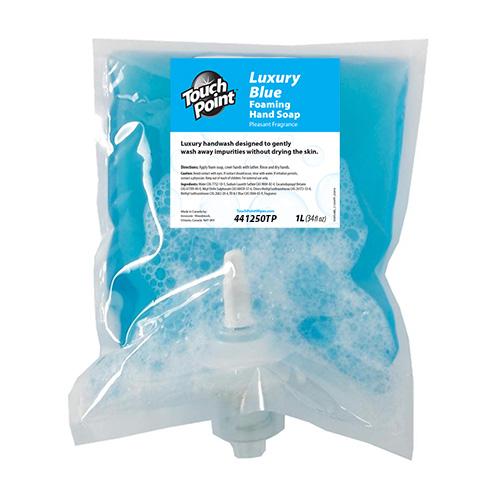
Why is Handwashing So Important?
Touch Point® hand washing liquid protects users from dangerous, contagious germs and bacteria.
At Hospeco Brands Group, we understand hygiene's critical role in safeguarding shared spaces and are committed to maintaining healthy environments.
How Do Germs Spread?
Germs have a remarkable ability to spread through everyday activities. Whether you're touching your face or handling commonly used surfaces like door handles, handrails, and counters, germs find multiple opportunities to enter the body. Unwashed hands can carry germs that, when transferred to surfaces or directly to others, contribute to the spread of illness.
Additionally, germs expelled when someone coughs or sneezes can linger on surfaces or be inhaled by others. This makes hand hygiene a cornerstone of disease prevention—not just for your health but for the well-being of everyone around you.
How Does Soap Remove Germs?
The key to effective handwashing lies in using soap and water together. Soap molecules play a crucial role by surrounding and trapping the oil, dirt, and germs on your skin. These molecules form tiny structures known as micelles, which suspend the trapped substances in the soapy water. When you rinse your hands, these unwanted particles are washed away. The Centers for Disease Control and Prevention (CDC) recommends scrubbing your hands for at least 20 seconds with a product like Touch Point® Hand Wash to remove as many germs as possible.

What is the Proper Technique for Washing Your Hands?
To maximize the effectiveness of handwashing, follow these steps:
-
WET YOUR HANDS: Start by getting your hands wet with warm to hot water, which helps create a more effective lather when you add soap.
-
LATHER UP: Work the soap into a good lather by rubbing your hands together.
-
SCRUB THOROUGHLY: Scrub your hands for at least 20 seconds, cleaning the palms, backs of your hands, between your fingers, and under your fingernails.
-
RINSE YOUR HANDS: Use clean, warm to hot, running water and dry them thoroughly.
-
IN PUBLIC RESTROOMS: Use a paper towel to turn off the taps and open the door, keeping your hands clean after washing.
When Should You Wash Your Hands?
Washing your hands with soap and water is essential when visibly dirty. Additionally, you should wash your hands:
-
After handling trash.
-
After handling pets or other animals.
-
After changing diapers or using the restroom.
-
Before and after treating any wounds.
-
Before and after helping someone sick, especially if they have been vomiting or had diarrhea.
-
After sneezing, coughing, or blowing your nose.
-
Before, during, and after preparing food.
-
Before eating.
Hand Sanitizer vs. Soap and Water: What's the Difference?
While alcohol-based hand sanitizers can quickly reduce the number of germs in many situations, they are not a substitute for soap and water. Soap and water are more effective at removing certain germs, including those that hand sanitizers cannot kill. For thorough cleaning, especially when dealing with harmful chemicals or when hands are visibly dirty, soap and water remain the gold standard.
For more information about maintaining proper hand hygiene, visit our Touch Point® Hand Care page to explore our range of soaps and dispensers.
Hospeco Brands Group proudly offers Touch Point® products including soaps, dispensers, and wipes, for hand and surface cleaning. Our mission is to provide the tools for your mission-critical public space hygiene goals.
Ready to learn more?
Contact a Hospeco Brands Account Representative today.

